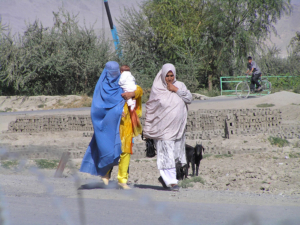Ray of Hope for Visually Impaired Women in Afghanistan
 Afghanistan, a country in Central Asia, has been affected by conflict for at least five decades. Years of war have not only destroyed the country’s infrastructure but have also had a profound impact on the physical and mental health of its inhabitants, as well as deteriorated the human rights situation, especially for women in Afghanistan.
Afghanistan, a country in Central Asia, has been affected by conflict for at least five decades. Years of war have not only destroyed the country’s infrastructure but have also had a profound impact on the physical and mental health of its inhabitants, as well as deteriorated the human rights situation, especially for women in Afghanistan.
Disabilities in Afghanistan
The prevalence of disabilities in Afghanistan has seen a significant increase, primarily attributed to the ongoing conflict, widespread destruction and the lack of accessible medical facilities. The 2019 Model Disability Survey revealed that around 80% of the population aged 18 and above experiences some form of disability, with women disproportionately affected, experiencing a 14.9% higher impact compared to men. Afghanistan has one of the highest numbers of people with any form of disability per capita in the world. This situation is exacerbated by widespread poverty, limited access to education and health care, minimal job opportunities and cultural stigmatization.
Visual Impairment
A report published by The Fred Hollows Foundation has estimated that 1.5 million individuals in Afghanistan are living with some form of visual impairment, with 600,000 of them experiencing complete blindness. A report published in The Kabul Times has indicated that many of these individuals are women. This data underscores the significant impact of visual impairment, particularly among women, in Afghanistan.
In Afghanistan, women face substantial discrimination. They are particularly vulnerable due to limited access to education, minimal job opportunities and economic freedom. These challenges are exacerbated when women also have a disability, as they face even greater levels of marginalization and discrimination in the form of physical and emotional abuse and social isolation.
Ray of Hope
The United Nations High Commissioner for Refugees (UNHCR), in partnership with the Welfare Association for the Development of Afghanistan (WADAN), has launched a project in two provinces in eastern Afghanistan. The project focuses on teaching braille, basic math and essential life skills such as cooking and using a cane. Additionally, the project provides psychosocial counseling to empower women to address daily societal challenges and confront violence. In 2022, the project benefited 90 women, with another 200 women currently enrolled, offering them hope for the future. UNHCR and WADAN plan to expand the program further.
The Rayhab School for Children with Disabilities is another initiative supporting disabled Afghans. The school offers primary education, food and transportation for blind, deaf and speech-impaired boys and girls from impoverished families in Kabul. The school welcomes more than 400 children daily, with 40% of them being girls.
The current efforts to address the situation in Afghanistan are commendable, yet they are insufficient compared to the enormity of the issue. Despite this, they serve as a beacon of hope for millions impacted.
– Maria Waleed
Maria is based in Yokohama, Japan and focuses on Good News, Global Health for The Borgen Project.
Photo: Flickr
